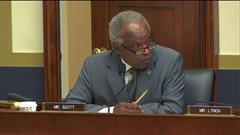Floor Speeches
Bipartisan Scott Amendment Passes As Part of Flood Insurance Reform LegislationAmendment would lower the cap on premium installment plan administrative fees
Washington,
June 21, 2017
Tags:
Housing
Congressman David Scott (GA-13) gave the following statement at the recent House Financial Services Committee Markup of Flood Insurance bills. Scott offered an amendment to greatly reduce installment plan fees for consumers who make monthly payments to purchase flood insurance. The amendment passed and was included as part of H.R. 1558, the Repeatedly Flooded Communities Preparation Act, which now leaves committee and moves to the full House of Representatives for consideration.
Click here to watch a video of Rep. Scott's remarks. "Thank you, Mr. Chairman. And first of all, I want to thank you, Chairman Hensarling, and ranking member Ms. Water, for working with me on this amendment. This is truly a bipartisan effort and as you know we certainly look for great opportunities when both Democrats and Republicans can work together on an important issue, and of course this flood issue is one. Last week I made the point that not only is the fifty dollar fee going to impact the exact people that this policy is trying to help, but also, flooding in and of itself is now a big, big issue and it’s going to be even a greater issue as we know of the warming of the earth in and of itself, and we want to make sure we get this for you right and that’s important—that once we put a dollar figure down in law, there is only one way that in most cases a dollar figure will go, and that’s up. So, additionally what caught me off guard is how we settled on the fifty dollar in the first place. And I agreed with my good friend Mr. Duffy last week that this might cost a little extra to setup systems to start collecting the monthly amount, but before we settle on the fifty dollars, let us figure out what the right amount is. So, we’re come up with this amendment, and we’ve had discussions with FEMA, and we’ve had discussions with industry stakeholders downtown last week and now. And we all collectively have put together a new amendment, and I might say, Mr. Chairman, this is going to be an extraordinary moment and I think that all of my colleagues would agree. Now, the thing is, we’re cutting the fifty dollars in half to twenty-five dollars. Secondly, we will direct FEMA to conduct a study assessing what is the correct, least burdensome fee we will have to charge people. Thirdly, when the study is completed, FEMA will report to our Financial Services Committee and the Senate Banking Committee on what that amount needs to be—and then FEMA can start charging an appropriate fee, But based on those actual costs. And four, finally, we are requiring FEMA to submit a report to Congress every year about the ongoing cost associated with the fee and flood insurance impact on the poor. And Mr. Chairman, I cannot express how much I support what this fourth figure is because it allows us to be able to monitor the situation, make adjustments that will keep in line with the growing problem we’re going to have with that. So, taken together, this new amendment will bring transparency to this fee that we didn’t have before—but it also ensures FEMA is doing everything possible to minimize the burden that poor families are faced with when trying to make payments on a monthly basis. And finally Mr. Chairman, over the weekend when I went home, and I enjoyed especially our train ride together to go vote, and our train ride together back to committee. And I said, “The Lord is wonderful, isn’t he?” And you said, “Let us find a way.” And I deeply appreciate that and Ms. Waters, I want to thank you for putting a lot of time on it, my cosponsor of the [original] monthly installment [amendment]. And I think we have something here that we can adjust. My final point is while I was home, we have the weather channel down there—I wanted to get information on what are the top states that are subjective to flooding, and they gave them: Georgia, Florida, South Carolina, Alabama, Louisiana, Texas and Mississippi—on a constant basis. And what else corresponds with that? There are a disproportionate number of poor people in these key states. So I thank you Mr. Chairman and I hope we get it passed." |


